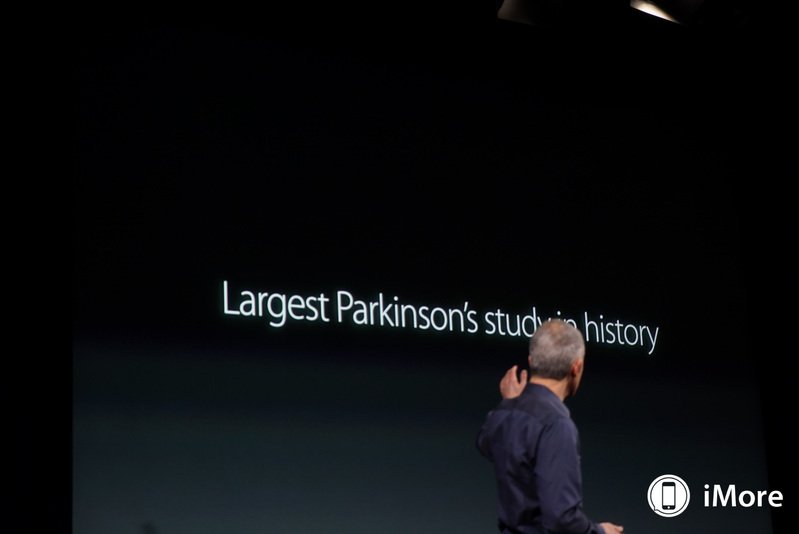ResearchKit has 'clearly transformed research' and CareKit will empower people with their health data

During its Spring 2016 event, Apple took some time to provide an update on how its Health data is affecting the lives of many. Apple's Chief Operating Officer, Jeff Williams, stated that the Parkinson's study became the largest in history in less than 24 hours. The Parkinson's app could help track per-patient data Mount Sinai asthma app got participants from all 50 states, allowing them to collect data from around the country. Massachusetts General Hospital got enough data that they were able to determine that sub-types of Type 2 Diabetes existed.
ResearchKit is also powering the team at Duke while creating an at-home tool to help in diagnosing autism by using the front-facing camera and algorithms to analyze emotional responses of children. The Epi Watch app uses the Apple Watch to gather data during seizures, which then used data to develop a seizure detector alert app.
Now, Apple has announced CareKit, a new way to empower people with data about their health. Some of the initial launch partners include Rochester General Hospital, UCSF, The Johns Hopkins Hospital, PDCNY. Standford Medicine, Emory Healthcare. An example of a Care Kit app from Texas Medical Center is an app that allows patients to record recovery data and the plan can easily be updated by a physician remotely. Apple notes that "nothing is more sensitive than your health data," and will ensure that all the data is kept safe. CareKit will be open source just like ResearchKit when it is made available in April.
Press releases
Apple Announces Advancements to ResearchKit
Studies Incorporate Genetic Data for Postpartum Depression, Asthma & Cardiovascular Disease
CUPERTINO, California — March 21, 2016 — Apple® today announced advancements to the open source ResearchKit™ framework that bring genetic data and a series of medical tests typically conducted in an exam room to iPhone® apps. Medical researchers are adopting these new features to design targeted studies for diseases and conditions that affect billions of people around the world and to gather more specific types of data from participants.
"The response to ResearchKit has been fantastic. Virtually overnight, many ResearchKit studies became the largest in history and researchers are gaining insights and making discoveries that weren't possible before," said Jeff Williams, Apple's chief operating officer. "Medical researchers around the world continue to use iPhone to transform what we know about complex diseases, and with continued support from the open source community, the opportunities for iPhone in medical research are endless."
Master your iPhone in minutes
iMore offers spot-on advice and guidance from our team of experts, with decades of Apple device experience to lean on. Learn more with iMore!
ResearchKit turns iPhone into a powerful tool for medical research by helping doctors, scientists and other researchers gather data more frequently and more accurately from participants anywhere in the world using iPhone apps. Participants enrolled in these app-based studies can review an interactive informed consent process, easily complete active tasks or submit survey responses, and choose how their health data is shared with researchers, making contributions to medical research easier than ever.
By delivering ResearchKit as open source, any developer can quickly design a research study for iPhone. They can also build on the available software code and contribute their tasks back to the community to help other researchers do more with the framework. Using a new module just released to the open source community, researchers are now able to incorporate genetic data into their studies in a seamless, simple and low cost way. Designed by 23andMe, the module allows study participants to easily contribute their genetic data to medical research. Researchers are also working with the National Institute of Mental Health to deliver "spit kits" to study participants based on a series of survey results.
"There's so much we still need to learn about postpartum depression and it may be DNA that provides the key to better understanding why some women experience symptoms and others do not," said Samantha Meltzer-Brody, MD, MPH, director of the Perinatal Psychiatry Program at the UNC Center for Women's Mood Disorders. "With ResearchKit, and now the ability to incorporate genetic data, we're able to engage women with postpartum depression from a wide geographic and demographic range and can analyze the genomic signature of postpartum depression to help us find more effective treatments."
"Collecting this type of information will help researchers determine genomic indicators for specific diseases and conditions," said Eric Schadt, PhD, the Jean C. and James W. Crystal Professor of Genomics at the Icahn School of Medicine at Mount Sinai, and Founding Director of the Icahn Institute for Genomics and Multiscale Biology. "Take asthma, for example. ResearchKit is allowing us to study this population more broadly than ever before and through the large amounts of data we're able to gather from iPhone, we're understanding how factors like environment, geography and genes influence one's disease and response to treatment."
ResearchKit studies incorporating genetic data: Postpartum Depression: PPD Act is a new app-based study that will use genetic testing to better understand why some women are impacted by postpartum depression by examining the genetic makeup of those with the condition. Led by the University of North Carolina School of Medicine and the international Postpartum Depression: Action Towards Causes and Treatment Consortium, PPD Act will offer study participants access to a "spit kit" from the National Institute of Mental Health. Cardiovascular Disease: Developed by Stanford Medicine, the MyHeart Counts app will use genetic data from existing 23andMe customers to help determine predisposition to heart conditions and measure how a participant's activity and lifestyle relate to cardiovascular health. By studying these relationships on a broad scale, researchers hope to be able to better understand how to keep hearts healthy. Asthma: The Asthma Health app, designed to track symptom patterns in an individual and identify potential triggers for these symptoms, will use genetic data from 23andMe customers to help researchers better understand ways to personalize asthma treatment. Asthma Health is designed by the Icahn School of Medicine at Mount Sinai and LifeMap Solutions.
Researchers continue to adapt ResearchKit and build on the framework by contributing new modules that bring exam room medical tests to iPhone apps. Key contributions include the ability to study tone audiometry; measure reaction time through delivery of a known stimulus to a known response; assess the speed of information processing and working memory; use the mathematical puzzle Tower of Hanoi for cognition studies; and conduct a timed walk test.
ResearchKit studies continue to expand internationally and are available in Australia, Austria, China, Germany, Hong Kong, Ireland, Japan, Netherlands, Switzerland, the UK and the US. ResearchKit apps are available on the App Store® for iPhone 5 and later, and the latest generation of iPod touch®.
Apple revolutionized personal technology with the introduction of the Macintosh in 1984. Today, Apple leads the world in innovation with iPhone, iPad, Mac, Apple Watch and Apple TV. Apple's four software platforms — iOS, OS X, watchOS and tvOS — provide seamless experiences across all Apple devices and empower people with breakthrough services including the App Store, Apple Music, Apple Pay and iCloud. Apple's 100,000 employees are dedicated to making the best products on earth, and to leaving the world better than we found it.
Apple Advances Health Apps with CareKit
New Software Framework Helps Developers Empower People to Take a More Active Role in their Health
CUPERTINO, California — March 21, 2016 — Apple® today announced CareKit™, a new software framework designed to help developers enable people to actively manage their own medical conditions. iPhone® apps using CareKit make it easier for individuals to keep track of care plans and monitor symptoms and medication; providing insights that help people better understand their own health. With the ability to share information with doctors, nurses or family members, CareKit apps help people take a more active role in their health.
"We're thrilled with the profound impact ResearchKit has already had on the pace and scale of conducting medical research, and have realized that many of the same principles could help with individual care," said Jeff Williams, Apple's chief operating officer. "We believe that giving individuals the tools to understand what is happening with their health is incredibly powerful, and apps designed using CareKit make this a reality by empowering people to take a more active role in their care."
CareKit will be released as an open source framework next month allowing the developer community to continue building on the first four modules designed by Apple, that include: * Care Card helps people track their individual care plans and action items, such as taking medication or completing physical therapy exercises. Activities can automatically be tracked and entered using sensors in Apple Watch® or iPhone; * Symptom and Measurement Tracker lets users easily record their symptoms and how they're feeling, like monitoring temperature for possible infections or measuring pain or fatigue. Progress updates could include simple surveys, photos that capture the progression of a wound or activities calculated by using the iPhone's accelerometer and gyroscope, like quantifying range of motion; * Insight Dashboard maps symptoms against the action items in the Care Card to easily show how treatments are working; and * Connect makes it easy for people to share information and communicate with doctors, care teams or family members about their health and any change in condition.
"With ResearchKit, we quickly realized the power of mobile apps for running inexpensive, high-quality clinical studies with unprecedented reach," said Ray Dorsey, MD, David M. Levy Professor of Neurology at the University of Rochester Medical Center. "We hope that CareKit will help us close the gap between our research findings and how we care for our Parkinson's patients day-to-day. It's opening up a whole new opportunity for the democratization of research and medicine."
Developers of health and wellness apps are excited to build these CareKit modules into apps for Parkinson's patients, post-surgery progress, home health monitoring, diabetes management, mental health and maternal health. * Sage Bionetworks and the University of Rochester are using CareKit to turn the mPower ResearchKit™ study into a valuable tool to help better inform patients about their condition and care providers about treatment. * The Texas Medical Center is designing apps to guide and support care pathways for its 8 million patients to improve their health through enhanced connectivity with their care teams. * Beth Israel Deaconess Medical Center will provide patients with more insight into their own chronic care management through home health monitoring devices that securely store data in HealthKit™. * One Drop is empowering people with a better approach to managing their diabetes. * Start, by Iodine, helps people on antidepressants understand if their medication is working for them or not, and helps their doctors deliver more informed care. * Glow, Inc. will incorporate CareKit modules into its pregnancy app, Glow Nurture, to guide women through a healthier pregnancy.
For more information, visit www.apple.com/carekit.
Apple revolutionized personal technology with the introduction of the Macintosh in 1984. Today, Apple leads the world in innovation with iPhone, iPad, Mac, Apple Watch and Apple TV. Apple's four software platforms — iOS, OS X, watchOS and tvOS — provide seamless experiences across all Apple devices and empower people with breakthrough services including the App Store, Apple Music, Apple Pay and iCloud. Apple's 100,000 employees are dedicated to making the best products on earth, and to leaving the world better than we found it.
Jared started off writing about mobile phones back when BlackBerry ruled the market, and Windows Mobile was kinda cool. Now, with a family, mortgage and other responsibilities he has no choice but to look for the best deals, and he's here to share them with you.

